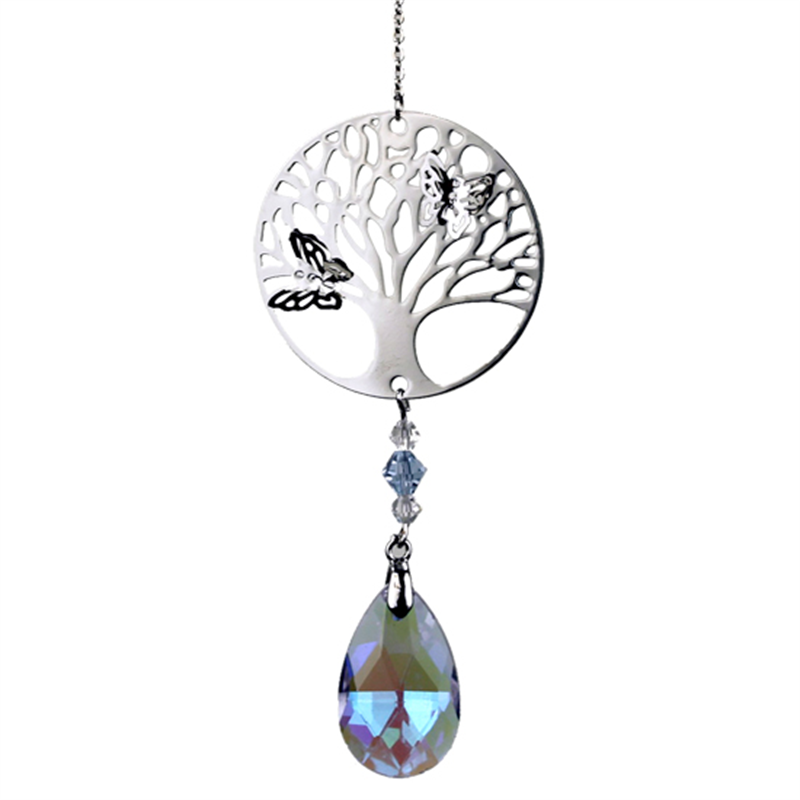1
/
of
2
Phoenix
Tree of Life with rainbow crystal drops white
Tree of Life with rainbow crystal drops white
No ratings
Regular price
€6,49
Regular price
Sale price
€6,49
Unit price
/
per
Tax included.
Shipping calculated at checkout.
Couldn't load pickup availability
Feng Shui
Feng Shui (fɤŋ ʂu̯eɪ̯) is a philosophy more than 3,000 years old that teaches us how our environment influences our well-being. Feng Shui explains how the design, styling and interior of our living space influence our happiness, but also how negative influences can be changed into positive ones. Feng Shui strives to adapt our living and working environments to stimulate a harmonious flow of chi (life force). Chinese philosophy is all about harmony and balance between the opposing forces of yin and yang, female and male, etc.
Dimensions: 30cm
The Tree of Life in various religions and spiritual traditions
Tree of Life, ancient Iran
In Iranian mythology, there are several sacred plant icons related to life, healing and eternity. Like guardian of plants, goddess of trees and immortality.
Tree of Life, ancient Mesopotamia
The Assyrian Tree of Life was represented by a series of nodes and intersecting lines. However, the name "Tree of Life" is the modern name, which was not used in the Assyrian period.
Tree of Life, Baha'i Faith
The concept of the Tree of Life appears in the writings of the Bahá'í Faith, where it can refer to the Manifestation of God, a great teacher who appears to humanity from time to time.
Tree of life, Buddhism
According to Buddhist tradition, the Bodhi or Bo tree is the tree (Ficus religiosa) under which Buddha sat when he achieved enlightenment in Bodh Gaya, India, about 2,500 years ago.
Tree of Life, China
In Chinese mythology, a tree of life is often depicted in combination with a phoenix and a dragon, with the dragon often representing immortality. A Taoist story tells of a tree that produces a peach of immortality every three thousand years, and anyone who eats this fruit becomes immortal.
Tree of Life, Europe
Antoine-Joseph Pernety, a famous writer and alchemist of the 18th century, identified the tree of life with the elixir of life and the philosopher's stone.
Tree of Life, Germanic Paganism and Norse Mythology
In Germanic paganism, trees play a prominent role and appear in various aspects in traditional texts and even in the names of the Germanic gods. The Tree of Life appears in Norse religion as Yggdrasil, the World Tree, which extends over 9 realms and contains the 3 magical sources of all life: the source of wisdom and knowledge, the source of the past, the present and the future and the Source of space, the cosmos itself.
Tree of life, Islam
Trees also play an important role in the Koran. The date palm is mentioned about 20 times and is described as coming from paradise and being healing. It is the tree under which Mary - according to Allah - gave birth to Jesus. About the olive tree it is written: "It showed the pure river of the water of life, clear as crystal, coming from the throne of the Lamb of God. In the middle of the path and across the river grows the tree of life, which produces twelve baskets of fruit every month carries. And the leaves of this tree serve to heal people."
Tree of Life, Mesoamerica - the Mayan culture
Among the Maya, the central world tree was conceived as, or represented by, a ceiba tree. It represents the Axis Mundi, the stable center of the universe.
Tree of Life, Judaism
The tree of life is mentioned in the book of Genesis. The most famous tree in the Garden of Eden is the Tree of the Knowledge of Good and Evil, which Adam and Eve ate and were expelled from Paradise. Judaism also mentions the Tree of Life or the Tree of Souls. This tree produces souls and with them life itself.
Tree of Life, Native American
The Tree of Life motif is firmly rooted in Native American traditions, including Ojibway cosmology. The Tree of Life represents everything that lives on this planet and in the universe. It “beats” the rhythm of life, day after day, year after year, life after life. Native Americans highly value everything that lives and are masters at finding the balance between their own needs and what nature offers. to preserve.
Feng Shui (fɤŋ ʂu̯eɪ̯) is a philosophy more than 3,000 years old that teaches us how our environment influences our well-being. Feng Shui explains how the design, styling and interior of our living space influence our happiness, but also how negative influences can be changed into positive ones. Feng Shui strives to adapt our living and working environments to stimulate a harmonious flow of chi (life force). Chinese philosophy is all about harmony and balance between the opposing forces of yin and yang, female and male, etc.
Dimensions: 30cm
The Tree of Life in various religions and spiritual traditions
Tree of Life, ancient Iran
In Iranian mythology, there are several sacred plant icons related to life, healing and eternity. Like guardian of plants, goddess of trees and immortality.
Tree of Life, ancient Mesopotamia
The Assyrian Tree of Life was represented by a series of nodes and intersecting lines. However, the name "Tree of Life" is the modern name, which was not used in the Assyrian period.
Tree of Life, Baha'i Faith
The concept of the Tree of Life appears in the writings of the Bahá'í Faith, where it can refer to the Manifestation of God, a great teacher who appears to humanity from time to time.
Tree of life, Buddhism
According to Buddhist tradition, the Bodhi or Bo tree is the tree (Ficus religiosa) under which Buddha sat when he achieved enlightenment in Bodh Gaya, India, about 2,500 years ago.
Tree of Life, China
In Chinese mythology, a tree of life is often depicted in combination with a phoenix and a dragon, with the dragon often representing immortality. A Taoist story tells of a tree that produces a peach of immortality every three thousand years, and anyone who eats this fruit becomes immortal.
Tree of Life, Europe
Antoine-Joseph Pernety, a famous writer and alchemist of the 18th century, identified the tree of life with the elixir of life and the philosopher's stone.
Tree of Life, Germanic Paganism and Norse Mythology
In Germanic paganism, trees play a prominent role and appear in various aspects in traditional texts and even in the names of the Germanic gods. The Tree of Life appears in Norse religion as Yggdrasil, the World Tree, which extends over 9 realms and contains the 3 magical sources of all life: the source of wisdom and knowledge, the source of the past, the present and the future and the Source of space, the cosmos itself.
Tree of life, Islam
Trees also play an important role in the Koran. The date palm is mentioned about 20 times and is described as coming from paradise and being healing. It is the tree under which Mary - according to Allah - gave birth to Jesus. About the olive tree it is written: "It showed the pure river of the water of life, clear as crystal, coming from the throne of the Lamb of God. In the middle of the path and across the river grows the tree of life, which produces twelve baskets of fruit every month carries. And the leaves of this tree serve to heal people."
Tree of Life, Mesoamerica - the Mayan culture
Among the Maya, the central world tree was conceived as, or represented by, a ceiba tree. It represents the Axis Mundi, the stable center of the universe.
Tree of Life, Judaism
The tree of life is mentioned in the book of Genesis. The most famous tree in the Garden of Eden is the Tree of the Knowledge of Good and Evil, which Adam and Eve ate and were expelled from Paradise. Judaism also mentions the Tree of Life or the Tree of Souls. This tree produces souls and with them life itself.
Tree of Life, Native American
The Tree of Life motif is firmly rooted in Native American traditions, including Ojibway cosmology. The Tree of Life represents everything that lives on this planet and in the universe. It “beats” the rhythm of life, day after day, year after year, life after life. Native Americans highly value everything that lives and are masters at finding the balance between their own needs and what nature offers. to preserve.
Share


Subscribe to our newsletter
Be the first to know about new products and exclusive offers


